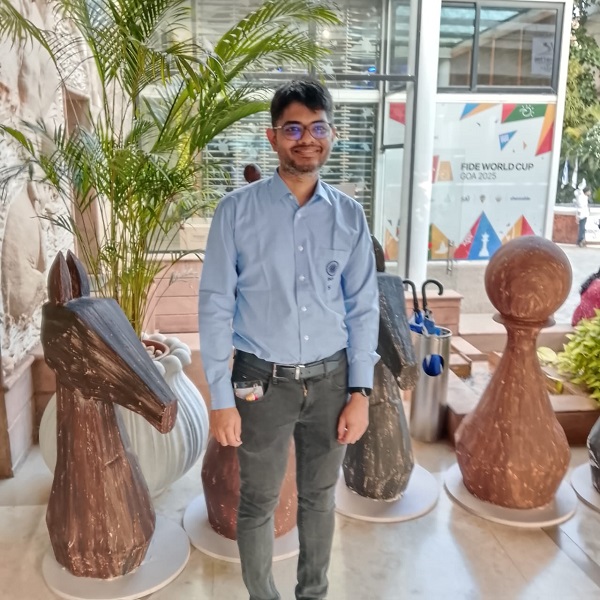
Indian GM Srinath Narayanan
PANAJI
Indian GM Srinath Narayanan, is a name synonymous to success with the Indian Open team that he coached to a historic gold at the Chess Olympiad in Budapest, Hungary last year.
Present in Goa at the FIDE World Cup in Arpora, though not as a player, he has a significant behind the scenes role. “I am here as a coach for the Indian contingent. Essentially, I am available to help any of the Indian players for any aspect that they may require,” the reputed coach disclosed to The Goan.
To another question, he asserted that he does not actually play much anymore. “I am pretty much a professional coach for the several years now and that remains my priority,” the Indian open team coach stated. “I started coaching around 2015. I trained a few of my friends initially, and they had good results. Through word-of-mouth, I began to train few more people. In general, a lot of players I worked with had immediate good results. However, slowly that encouraged me to coach further. At some point I realized that I enjoy this aspect as much as playing if not more. And that is how my coaching career began,” Srinath revealed.
On his coaching philosophy, Srinath explained, “The foundation is on minimal intervention. It is to identify the strength of the student and try to develop it as much as possible. One has to keep removing the obstacles in their part; whether it is their own habits or some external things or some mental distractions in order to help them reach the best of their potential.”
Srinath acknowledges that chess can benefit life in general. “Habits like planning things, anticipating things that can happen in the future and being prepared for it and also being self-aware towards a certain extent. We can realize the mistakes that we make and improve on that. We can also able to handle different moods of life. One day you are happy, on another you lose and it feels terrible. It is about understanding these things happens and being able to deal with it. A lot of things in chess get carried in life as well,” he pointed out.
As coach of the Indian Open team, Srinath opined that it is not tasking to handle the stress levels of his team to realize optimum performances. “To be honest, with the Indian team it is not as stressful because they are such phenomenally good players that they end up winning a lot more often than not. And they are so comprehensively stronger than lot of their opponents that by itself it takes away a lot of stress before it happens,” he said.
“Apart from that you also you learn to disconnect after a period of time. Because initially you feel very connected in the sense that the result of the student has an impact on the coach’s life in a number of different ways. If the student keeps losing then the coach will not have anything in their life. But on the other hand, you have to disconnect yourself from the result of the player especially of that particular game and work towards their long-term process. This helps in dealing with the stress because the result of any particular day can either be positive or negative. But when you are talking of long-term goals it is a lot easier to control the outcome and to ensure that they progress to become better players and better individuals in life. So, one of the ways to cope up with the stress is to take a more longer view approach and stop being affected too much by temporary things,” the non-playing captain of the Indian Open team elaborated.
Meanwhile, Srinath has also prepared a few courses largely on chess openings, and on very technical subjects. “I have targeted FIDE rated and higher-level players with courses on different chess openings like the Catalan Opening, the London System, the Classical Sicilian and the Queen’s Gambit Accepted. This is something I enjoy doing as it reaches out to a lot more people,” he divulged.
Having realized a number of Indian chess prodigies to mature to the next level, he mentions that he now has under his stead promising youngsters like Gautam Krishna (Kerala), Ethan Vaz (Goa) and Charvi Anilkumar (Bengaluru).
“I think it is really important to enjoy what you are doing. When you do anything with enjoyment you get the focus and attention that helps you to learn much faster and better. And if chess is what you enjoy, go in with your full heart,” Srinath concluded.